African and Afrodiasporic Mobilities and Identities
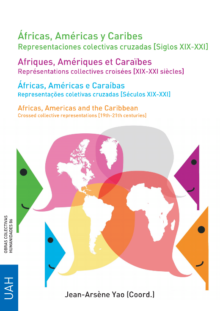
As (im) pertinências do método. Metodologia participativa e o estudo sobre a Afrodescendência em Portugal
Abstract:
The announcement of the Decade of African Descendants (2015-2024) by the UN, drew attention to the presence of African descendants in Europe, including in Portugal, as part of the contemporary social configuration of the continent. However, the focus on these people has been sustained, above all, in theories and representations of subalternity and exclusion that do not recognize them as new political subjects in a Europe that is no longer black and white. These politically hybrid subjects, in the historical and cultural sense, bring theoretical-epistemological and methodological challenges to the social sciences, since their visions, paradigms and ways of living escape the traditional lenses of the approaches that associate them with immigrants or refugees. We propose that in approaching the subject of Afrodescendence, method is central and determinant of the outcomes, ethical function and meaning of social research on emerging contemporary subjects. We argue in favour of participatory methodology, reflecting on its pertinence in a context where the people in the researched situation are critical subjects in their fields of intervention/action who reject being reduced to mere objects of study. We analyse the processes of negotiation in the field concluding on the contribution of this project to the dialogue between academics and the afrodescendant collectives. As (im)pertinências do método. Metodologia participativa e o estudo sobre a Afrodescendência em Portugal is inserted in the debate on the democratization of knowledge, sustained, in particular, by critical perspectives that are based on studies on emerging contemporary subjects.
Quotation:
Évora, Iolanda. “As (im)pertinências do método. Metodologia participativa e o estudo sobre a Afrodescendência em Portugal”, In: Yao, Jean-Arséne, Victorien Lavou Zoungbo et Luis Mancha San Esteban, eds. Forthcoming. Representations collectives croisées: Afriques, Amériques et Caraibes. Xix-xxi siècles. III GRELAT. Actas do Colóquio. Madrid: UAH Editora, 167-176. ISBN:978-84-18254-12-3.
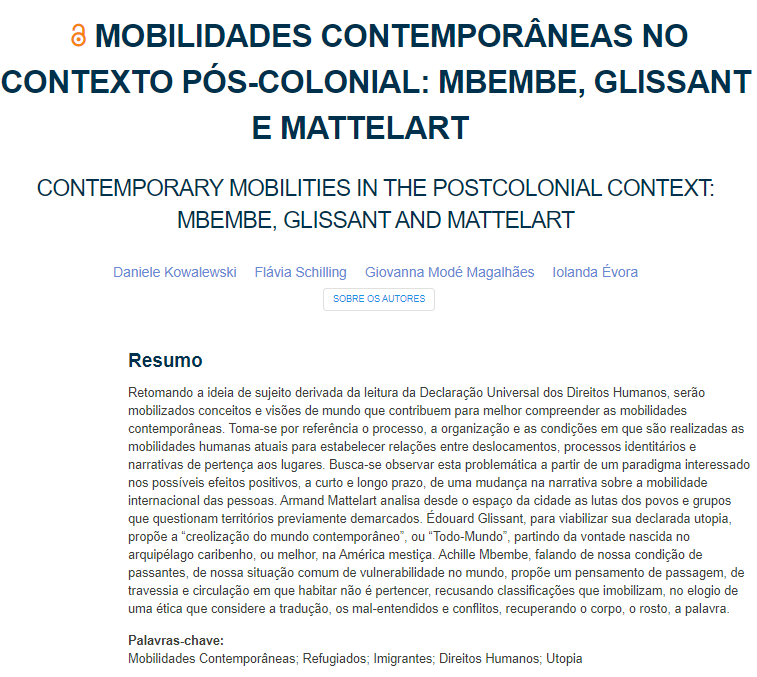
Mobilidades Contemporâneas no Contexto Pós-Colonial: Mbembe, Glissant e Mattelart
Abstract:
Taking up again the idea of subject derived from the reading of the Universal Declaration of Human Rights, concepts and worldviews will be mobilized that contribute to better understand contemporary mobilities. Reference is made to the process, the organization and the conditions in which current human mobilities are carried out to establish relationships between displacement, identity processes and narratives of belonging to places. In Mobilidades Contemporâneas no Contexto Pós-Colonial: Mbembe, Glissant e Mattelart we seek to observe this problematic from a paradigm interested in the possible positive effects, in the short and long term, of a change in the narrative on the international mobility of people. Armand Mattelart analyses, from the space of the city, the struggles of peoples and groups that question previously demarcated territories. To make his declared utopia viable, Édouard Glissant proposes the “creolisation of the contemporary world”, or the “All-World”, starting from the will born in the Caribbean archipelago, or rather, in mestizo America. Achille Mbembe, speaking of our condition of passers-by, of our common situation of vulnerability in the world, proposes a thought of passage, of crossing and circulation in which to inhabit is not to belong, refusing classifications that immobilise, in praise of an ethic that considers translation, misunderstandings and conflicts, recovering the body, the face, the word.
Quotation:
“Kowalewski, Daniele, Schilling, Flávia, Magalhães, Giovanna Modé, & Évora, Iolanda. (2019). Mobilidades Contemporâneas no Contexto Pós-Colonial: Mbembe, Glissant e Mattelart. Lua Nova: Revista de Cultura e Política, (108), 137-156. Epub November 28, 2019. https://doi.org/10.1590/0102-137156/108“
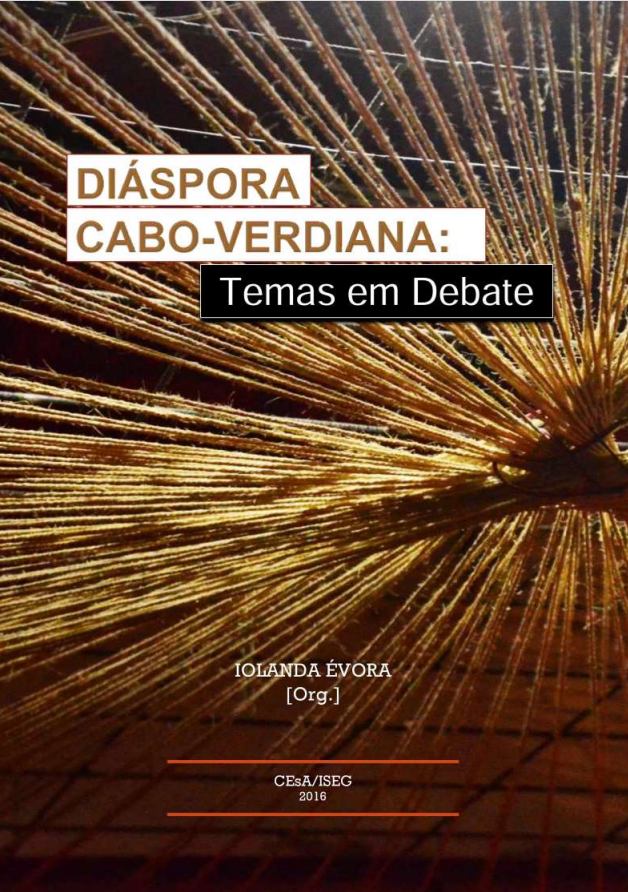
Diáspora Cabo-Verdiana: Temas em debate
Abstract:
The idea of this collection originates from the interest in retaining in the same work important themes that are currently under debate and that the social sciences have been addressing regarding the Cape Verdean diaspora. From specific theoretical fields and their own empirical work, the authors choose the Cape Verdean diaspora society as their object, exploring dynamics that together make up the Cape Verdean diasporic space and describe the complexity inherent to its constitution. We aimed at gathering contributions that are not only concerned with mapping the current global dispersion of Cape Verdeans (including the second third resettlements in locations such as, for instance, the Schengen area, after the insertions of the first Cape Verdeans in Europe) but, above all, with deciphering the complex processes of diasporisation. We hope that Diáspora Cabo-verdiana: temas em debate will contribute to reinforce the attention of social scientists regarding the ways in which the Cape Verdean diaspora is constituted in temporal and spatial terms, the engagement of communities among themselves and with Cape Verde, knowing that this, in turn, also experiences, in its temporal and spatial structure, new ways of remembering, imagining and engaging its diaspora today.
Quotation:
Évora, Iolanda (coord.) /2016). Diáspora Cabo-verdiana: temas em debate. Lisboa: CEsA – Centro de Estudos sobre África, Ásia e América Latina.
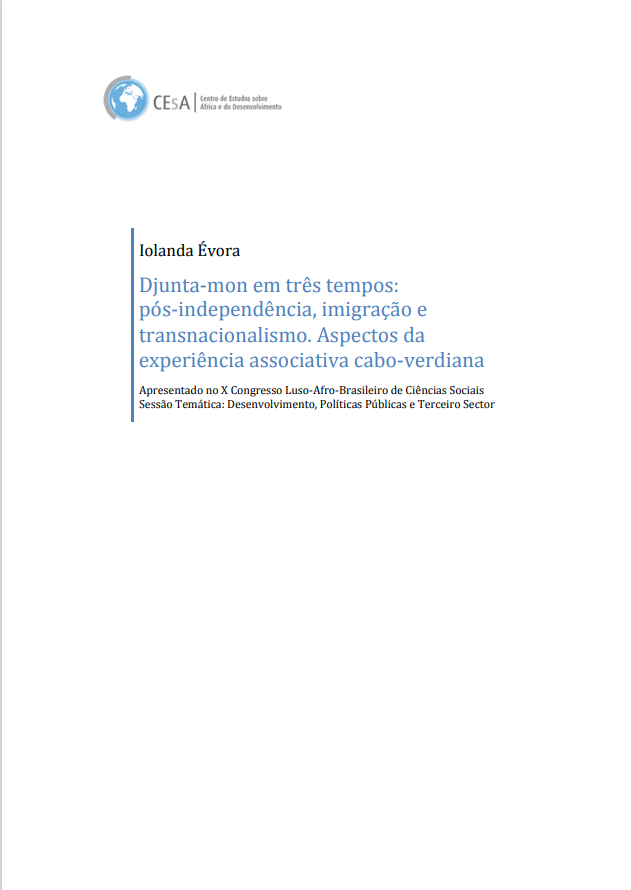
Djunta-mon em Três Tempos: Pós-independência, imigração e transnacionalismo. Aspectos da experiência associativa cabo-verdiana
Abstract:
Djunta-mon em três tempos: pós-independência, imigração e transnacionalismo. Aspectos da experiência associativa cabo-verdiana focuses on voluntary associations and discusses the material and psychosocial conditions of membership and participation of members. These aspects are analyzed from the point of view of the members of cooperatives in the rural area of the island of Santiago, created in the post-independence period, and of Cape Verdean immigrant associations in Portugal. In Santiago, we identified both singular forms of appropriation of the official ideological base and governmental objectives, as well as cultural permanences that, through practices such as djunta-mon, ensure the protection of social identities and allow familiarity and subjective control of this social practice. . In immigration, spontaneous associations propose to maintain identity, promote social inclusion or solve common problems and needs and reflect the heterogeneity, social cleavages and class divisions of origin that are reproduced in immigration. Currently, formal demands for greater rigor and technical and human competence in its functioning seem to weaken spontaneous and voluntary adhesion and the djunta-mon. At the same time, it questions the traditional role of these associations in the face of changes in immigration with the inclusion of new profiles such as transnational migrants. We examine the adaptability of this collective strategy, indicating that in the past, in the present and in the face of the possibility of a transnational associative practice, the use of the traditional djunta mon adapted to the lived context, ensures the maintenance of the strong network of reciprocity and sociability essential to survival and success. of the associations.
Quotation:
Évora, Iolanda. 2011. “Djunta-mon em três tempos: pós-independência, imigração e transnacionalismo. Aspectos da experiência associativa cabo-verdiana”. Comunicação apresentada no X Congresso Luso-Afro-Brasileiro de Ciências Sociais, Sessão Temática Desenvolvimento, Políticas Públicas e Terceiro Sector
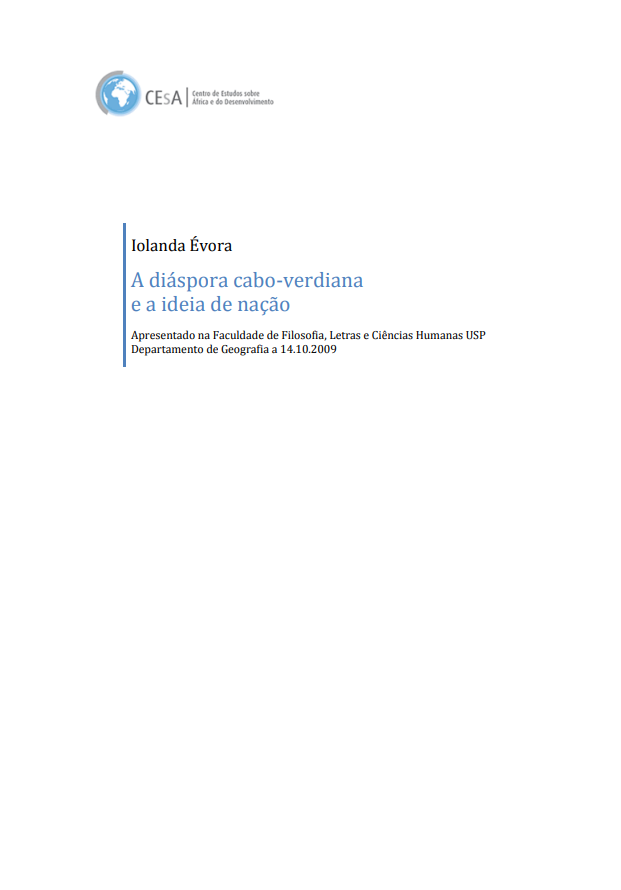
A Diáspora Cabo-verdiana e a Ideia de Nação
Abstract:
Starting from the notion of place as a horizon of connections, of productions of meanings and of struggles, the perspective we adopt highlights, on the one hand, a series of issues that have been little addressed, and, at the same time, shows its potential in the re-elaboration of the migratory phenomenon as a whole (which includes, for example, a psychosociology of the place of origin as a fundamental part of a diaspora nation as well). In addition to this interest from a social and academic place, there is no doubt that the topic “diaspora and nation”, when referred to Cape Verde, already arouses interest, that is, it is an impertinent (because provocative) subject, if we think about the mismatch between the geographical territoriality of the country (ten islands and 4033 km2 ) and the national (the islands and the diaspora). This means that it immediately indicates a challenge because geographical proximity is not adopted here as the criterion for defining a nation. On the contrary, in the case of Cape Verde, it is stated that the nation, in its definition, is only attainable if one also considers those who are physically distant from the territorial place called Cape Verde. A diáspora cabo-verdiana e a ideia de nação was delivered at the Faculdade de Filosofia, Letras e Ciências Humanas USP Departamento de Geografia on 14.10.2009.
Quotation:
Évora, Iolanda. 2011. “A diáspora cabo-verdiana e a ideia de nação”. Comunicação apresentada na Faculdade de Filosofia, Letras e Ciências Humanas, USP Departamento de Geografia, Brasil.
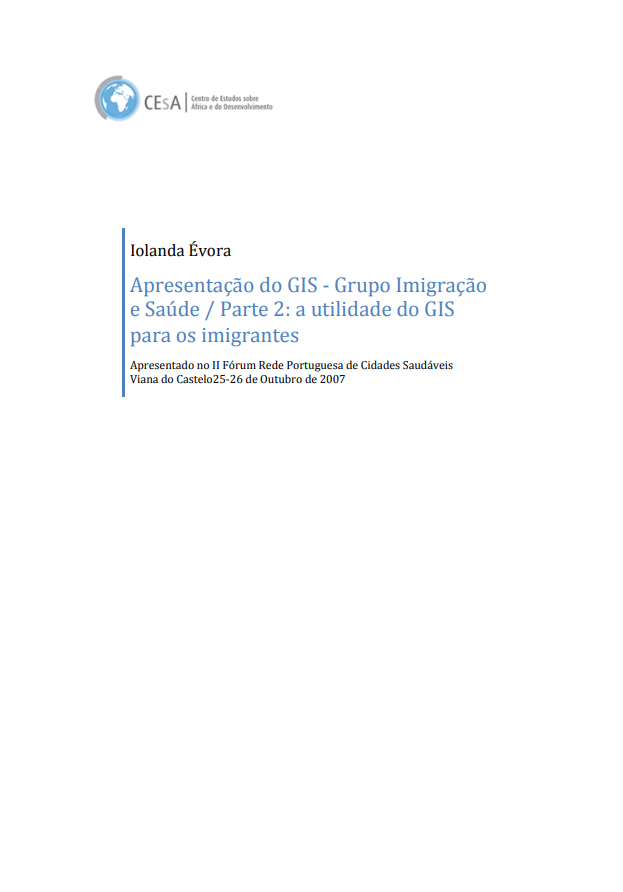
Apresentação do GIS – Grupo Imigração e Saúde Parte 2: A utilidade do GIS para os imigrantes
Abstract:
GIS (Immigration and Health Group) proposes the involvement (virtual and real) of people, public and private institutions which, by their professional activity, develop research projects and tasks related to the health of the immigrant population. At this moment, GIS is already a reference as a privileged and credible source of information on health/immigration initiatives. With its functioning model – decentralised action, provided by the network structure, in which initiatives are suggested by all – it has promoted an intense exchange, which in the field of immigration and health, is perhaps unprecedented in Portugal, if we think of the scale of its reach and the number of members of the group. This exchange is made between its members, whose actions may be academic or more practical, therefore, of intervention in the field. An analysis of the profile of the GIS members shows that a significant part of them deal with the immigration/health theme at both possible levels of action, either at the academic or practical level of intervention. Because of this profile, and because GIS promotes the meeting of people and their institutions at both levels, we can say that GIS is an important practical-reflective proposal, therefore, an important contribution to a more reflected intervention and a reflection closer to reality, when it comes to immigration/health. Apresentação do GIS – Grupo Imigração e Saúde Parte 2 : a utilidade do GIS para os imigrantes was given at the II Forum Portuguese Healthy Cities Network Viana do Castelo 25-26 October 2007.
Quotation:
Évora, Iolanda. 2011. “Apresentação do GIS – Grupo Imigração e Saúde Parte 2 : a utilidade do GIS para os imigrantes”. Comunicação apresentada no II Fórum Rede Portuguesa de Cidades Saudáveis, Viana do Castelo.
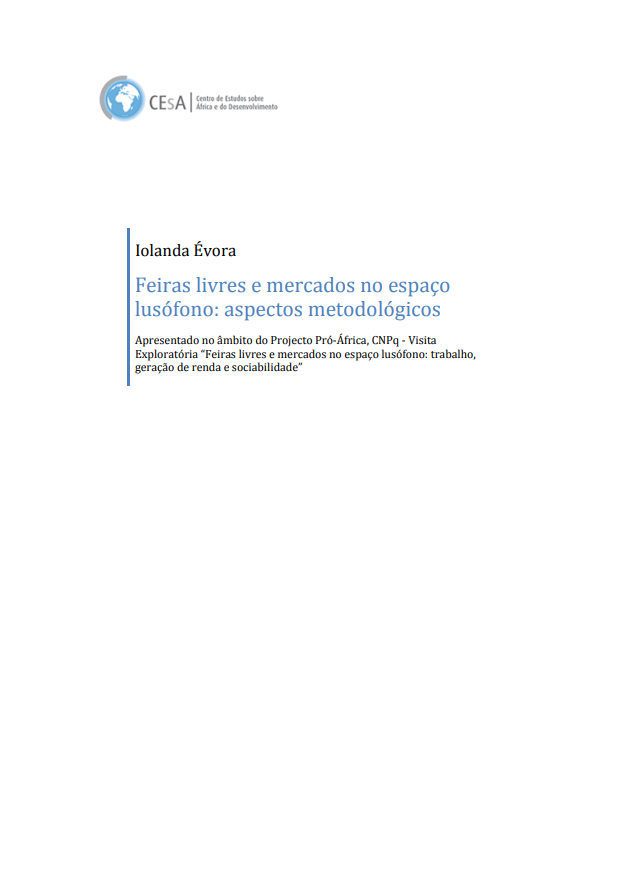
Feiras Livres e Mercados no Espaço Lusófono: Aspectos metodológicos
Abstract:
In Feiras livres e mercados no espaço lusófono: aspectos metodológicos the focus falls on aspects of the field of our research and we understand that a reflection on it is important due to: 1- specificities of our empirical object (the free fairs and markets that are work and economic activities present in urban centres in Brazil, Cape Verde and Guinea-Bissau; 2- our methodological options and ethical-political stance towards social reality and its actors; 3- the type of study we intend to carry out. Among the structuring axes of our research proposal we highlight that 1- we have the same set of concerns in relation to the different realities and contexts of study, that is, our focuses are: (a) the everyday processes that organize work in markets and free markets; (b) the conditions for the construction of a work base, that is, the set of knowledge, material resources and personal relationships that enables workers to generate income through work in micro-enterprises; 2- it is not intended to collect data for a comparison, but to ensure a cumulative knowledge, in which the realities of local fairs and markets, in each of the urban centres, are studied in their uniqueness and illuminate the understanding of the other contexts. This paper was presented at the Pro-Africa Project.
Quotation:
Évora, Iolanda. 2011. “Feiras livres e mercados no espaço lusófono: aspectos metodológicos”. Comunicação apresentada no âmbito do Projeto Pró-África, CNPq Visita Exploratória “Feiras livres e mercados no espaço lusófono: trabalho, geração de renda e sociabilidade.
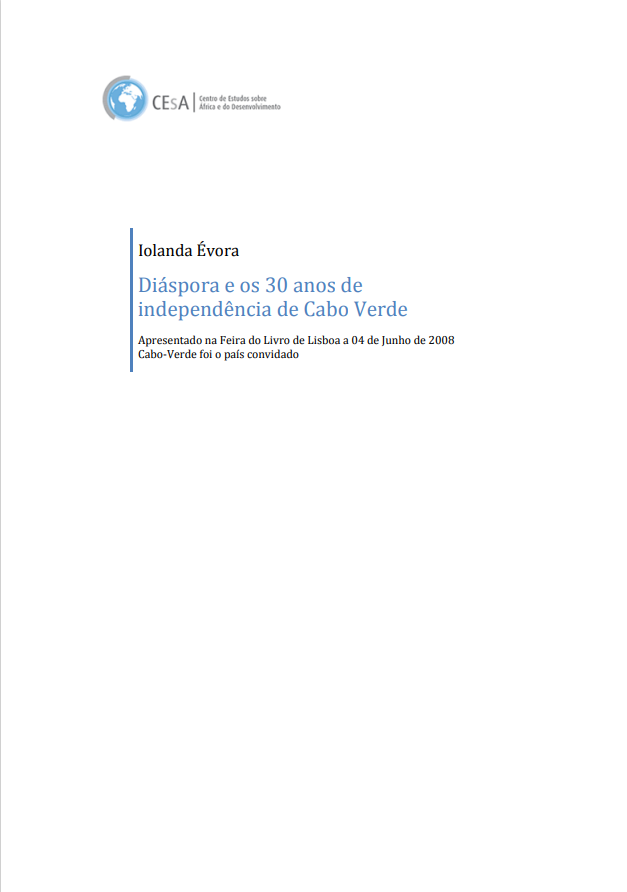
Diáspora e os 30 anos de independência de Cabo Verde
Abstract:
It would surprise most Cape Verdeans to know that what we live and designate as diaspora does not correspond to the most classical definitions about diaspora, which refer to secular migratory experiences that mobilise numerically significant populations and with a solid experience of exchange and mobility of long standing. But there are authors who argue that, for the term to be fruitful, it should be used in a neutral way and not be reserved only for certain populations whose social quality is ennobled: the exchange, in the case of traders, the intellectuals; the antiquity of the civilisation (in the case of the Greeks, Chinese or Indians) or the extent of the original catastrophe (in the case of the Jews, Armenians or Palestinians). These authors say that, in order to have value, it must be applied to all dispersed populations that maintain links, whatever their prestige. On the contrary, Cape Verdeans in general seem to have no doubt that we are a diaspora and it was during the last few years that the term has been consolidated among us and has come to define an important aspect of Cape Verdean society and sociability. Diaspora came to designate us as a historical collectivity which, with its dispersion in different political organisations (or because of this dispersion, in my opinion), maintains a reference to a collective identity and forms of solidarity among itself. Diáspora e os 30 anos de independência de Cabo Verde is a communication presented in Lisbon, 4th June 2008 Book Fair. Cape Verde was an invited country.
Quotation:
Évora, Iolanda. 2011. “Diáspora e os 30 anos de independência de Cabo Verde”. Comunicação apresentada na Feira do livro, Lisboa.
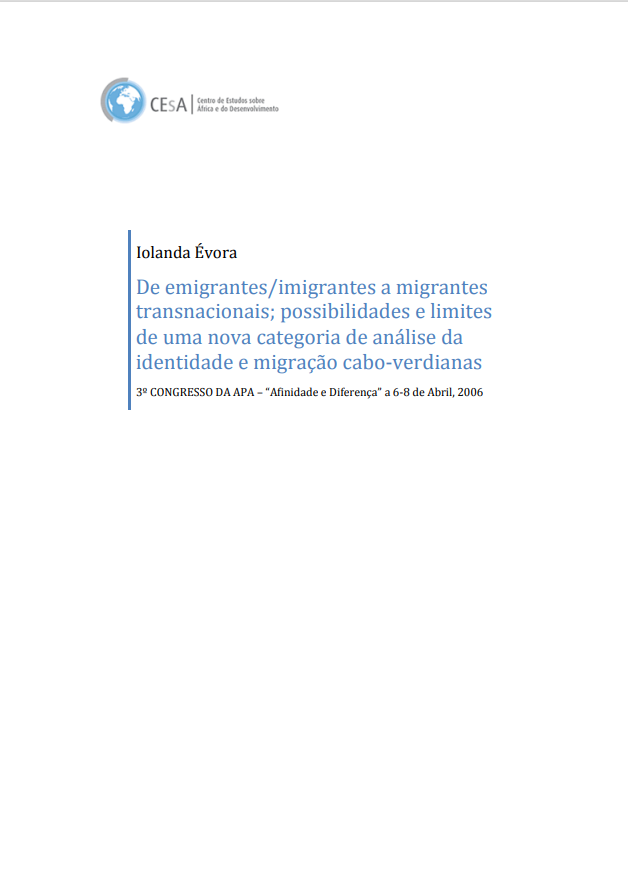
De Emigrantes/Imigrantes a Migrantes Transnacionais; Possibilidades e limites de uma nova categoria de análise da identidade e migração cabo-verdianas
Abstract:
In the field of Cape Verdean migration, transnationalism has been consolidating itself as a new lens for approaching the old experiences of exchanges and participation in social practices that transcend national borders. At the same time, studies on Cape Verdean identity and migration show the preponderance of the dual existence of emigrants/immigrants as a way of recognizing people and groups. In De emigrantes/imigrantes a migrantes transnacionais; possibilidades e limites de uma nova categoria de análise da identidade e migração cabo-verdianas, we propose to examine the correspondences or oppositions between the evident consolidation of Cape Verdean transnationalism as an object of study of the social sciences and the possibilities of constituting a new identity constellation through which individuals and groups recognize themselves as transnational migrants. Transnationalism and identity are concepts whose juxtaposition seems inherent, insofar as, as a social field, transnationalism includes sociological variables that exert a discernible effect on the psychological field of identity. From the perspective of the social field, the changes that the transnational way of living operates in the ways of living assimilation/exclusion in places of immigration and, among other ties, the myth of the return to origin, will be examined. A new dynamism in the construction, negotiation and reproduction of identities means, for each actor, defining themselves differently in terms of class, race and gender. In addition, other social categories may emerge in this context, and even with different degrees of salience among themselves, in the social field, they support the need for new reference structures that can capture the social and economic experiences of migrants in different places.
Quotation:
Évora, Iolanda. 2011. “De emigrantes/imigrantes a migrantes transnacionais; possibilidades e limites de uma nova categoria de análise da identidade e migração cabo-verdianas”. Comunicação apresentada ao 3º Congresso da APA – Afinidade e Diferença. Lisboa
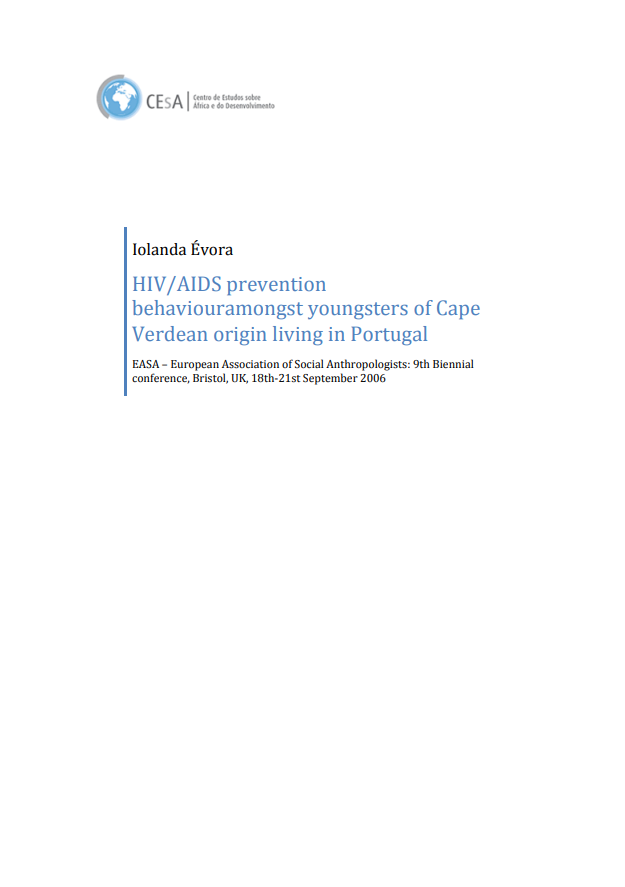
HIV/AIDS Prevention Behaviour Amongst Youngsters of Cape Verdean Origin Living in Portugal
Abstract:
This paper deals with the preventive AIDS behaviour of youngsters of Cape Verdean origin living in Lisbon. It focuses on the group practices and representations of AIDS and gender oriented sexual behaviour. Based on an ongoing research project, the paper argues how AIDS has the potential to become another discriminatory factor in a group already racially and socially stigmatized. This research aims to understand the relation between what young people know about HIV/AIDS and their active prevention behaviour. In addition, it explores how the immigration context may interfere in their behaviour and opinions towards HIV/AIDS and in the practices considered the safest ones to adopt. Therefore, this research is amongst those that aim to ground HIV/AIDS health education proposals on a clear understanding of how different populations or groups conceive their own healthcare. For that purpose, we selected a sample of young people from Cape Verdean origin presently living in Portugal, born in or outside of Cape Verde. Both genders were equally present (8 men and 7 women), aged between 16 and 26 and living in council estates, in other words, housing built on council’s urban redevelopment projects to relocate people from the slums. The areas of interest were chosen for presenting a high number of Cape Verdeans or their descendents: Lisbon, the Greater Lisbon and Loulé. We presuppose that belonging to these areas implies a particular social and economical context; for, although debatable, the definition of ‘council relocation housings’ conveys, to a great extent, a social categorization applied by a system of social classification to immigrants in Portugal. Accordingly, we considered eventual repercussions on the youngsters’ social experience and on their material and symbolic existential conditions, upon which rely daily decisions concerning health and prevention. A qualitative methodology of data collection was adopted, to allow an exhaustive explanatory study and the identification of several perceptual and behavioural patterns. Such methodology, developed by Rodrigues (1978,1999), is the most adequate to reach ‘irrational’ content – denomination commonly applied in Social Sciences to factors that “exist, but cannot be apprehended by reason” (Rodrigues, 1999, p.4). As the author refers, it is about reaching “that which cannot be measured, but is worthy of being known”, more specifically, the emotional content and deeper meaning of youth’s explanations regarding HIV/AIDS prevention behaviour. Thorough individual interviews were carried out, aiming to collect a material able to reveal the representations, the type of perception, the explanatory resources used, the justifications produced according to the roles occupied within a certain group, particularly, their position regarding immigration and HIV/AIDS. By using self-examination (free discourse), we were able to identify main areas of interest and concern, their importance, how they interrelate with their life and the surrounding world. Moreover, aiming to identify exactly how the interviewees place the AIDS issue within their life concerns. Intermediary Questions enable us to explore HIV/AIDS issues relevant to the project, though not spontaneously raised by the youngster during the Free Discourse approach. The Socioeconomic Questionnaire enabled an understanding of the life conditions of this group in Portugal, as well as of their family history. Today we shall discuss here the subject of family migration in its different phases and by each individual.
Quotation:
Évora, Iolanda. 2011. “HIV/AIDS prevention behaviour amongst youngsters of Cape Verdean origin living in Portugal”. Comunicação apresentada na EASA – European Association of Social Anthropologists : 9th Biennial Conference, Bristol, United Kingdom.





